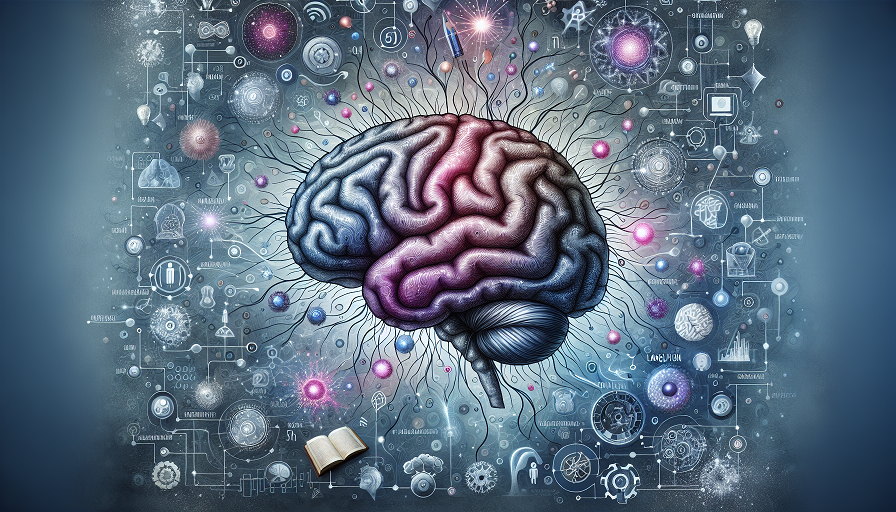Ever notice how you’re sharp as a tack in the morning but feel like a worn-out eraser by the afternoon? That’s your circadian rhythm talking. This internal clock governs your body’s natural cycles, telling you when to sleep, wake, eat, and even when your brain works best. Circadian rhythms don’t just affect sleep; they have a big impact on brain health and cognitive performance. Understanding how to work with your internal clock, instead of against it, can help keep your mind clear and your memory strong.
What Are Circadian Rhythms, and How Do They Work?
Your Brain’s Built-In Clock
Circadian rhythms are 24-hour cycles that run in the background of your brain and body. These rhythms are driven by the “master clock” in your brain called the suprachiasmatic nucleus (SCN), a tiny bundle of neurons in the hypothalamus. The SCN responds to light and darkness, sending signals throughout your body to regulate various functions based on the time of day.
Think of the SCN as your brain’s timekeeper. It controls your sleep-wake cycle, energy levels, hormone production, and even how alert you feel at certain hours. Just like the hands on a clock, circadian rhythms move at a steady pace, giving structure to everything from your mood to your ability to remember details.
The Influence of Light on Your Circadian Rhythms
Light is the biggest external factor affecting circadian rhythms. When sunlight hits your eyes, it sends a signal to the SCN, letting it know it’s time to wake up. At night, as it gets dark, the SCN cues your body to produce melatonin, the hormone that makes you sleepy. This natural response to light and darkness helps your body maintain a balanced rhythm that aligns with day and night.
But modern life often disrupts these rhythms. Bright screens at night, irregular sleep patterns, and artificial lighting can throw off your internal clock, leaving your brain feeling groggy or unfocused when it should be at its peak.
Why Circadian Rhythms Are Crucial for Brain Health
When circadian rhythms run smoothly, your brain functions more efficiently. But when these rhythms are off, it’s like trying to drive with foggy windows—it’s harder to think clearly, react quickly, and remember things accurately. Here’s a closer look at how circadian rhythms support brain health.
Memory and Learning
Our brains are naturally better at learning and retaining information at certain times of the day. Studies show that memory formation is strongest in the morning and early afternoon, while complex problem-solving is often best in the late morning. A disrupted circadian rhythm, however, can make it difficult for the brain to consolidate memories properly, impacting our ability to retain and recall information.
Sleep plays a critical role here. During sleep, the brain sorts through the day’s experiences, transferring new information from short-term to long-term memory. If you’re not sleeping at the right times or enough hours, your brain struggles to solidify memories, making it harder to recall details or learn new information over time.
Mood Regulation and Emotional Balance
Have you ever felt more irritable or anxious after a poor night’s sleep? Circadian rhythms affect mood as well. Certain times of the day are naturally more suited for relaxation, while others are better for focused activity. A balanced circadian rhythm helps regulate neurotransmitters like serotonin, which influence mood and stress levels. When circadian rhythms are disrupted, it can lead to mood swings, increased anxiety, and even depression.
How Circadian Rhythms Impact Cognitive Performance
Your brain isn’t a machine that performs at the same level all day. It has peak times for focus, creativity, and decision-making. Circadian rhythms help coordinate these optimal times, making it easier to align your day with your brain’s natural ups and downs.
Morning: Peak Alertness and Focus
Most people experience their highest levels of alertness and focus in the late morning. This is a great time for tasks that require attention to detail, critical thinking, and complex problem-solving. This natural peak is why so many people feel ready to tackle big projects or study in the morning.
Afternoon: Steady Productivity
The early afternoon is often marked by a slight dip in alertness, thanks to a drop in body temperature and energy. However, this is still a productive time for most people. Simple, routine tasks or activities that don’t require deep concentration are often best scheduled during this period. A quick afternoon walk or exposure to sunlight can help keep energy levels steady.
Evening: Creativity and Reflection
In the evening, the brain shifts gears. Many people find this time conducive to creative work or reflection, as the mind becomes more open to big-picture thinking. If you’re an evening thinker, this is often the time when new ideas or insights come more naturally.
Practical Ways to Align with Your Circadian Rhythms
Syncing your daily activities with your circadian rhythm isn’t as difficult as it sounds. By making a few adjustments, you can improve cognitive performance and feel more energized throughout the day.
Get Morning Sunlight
Spending 10-15 minutes in natural sunlight each morning helps set your internal clock for the day. Sunlight exposure in the morning tells your SCN it’s time to be alert, boosting mood and energy for the hours ahead. Plus, it can help regulate melatonin levels so you feel sleepy at night.
Create a Consistent Sleep Schedule
Going to bed and waking up at the same time every day helps stabilize your circadian rhythm. Aim for 7-9 hours of sleep each night, and try to keep your schedule consistent, even on weekends. A regular sleep routine lets your brain know when it’s time to rest and when it’s time to wake up, improving overall cognitive performance.
Limit Evening Screen Time
Blue light from screens can throw off your circadian rhythm by tricking your brain into thinking it’s still daylight. Try to turn off screens an hour before bed, or use blue light filters if you need to work late. This can help your brain wind down and prepare for a restful sleep.
Time Your Meals
Eating at regular times each day can also help regulate your circadian rhythm. When you eat at odd hours or snack late at night, it signals to your body that it’s still active time, potentially impacting your sleep and cognitive performance. Sticking to consistent meal times helps keep your internal clock in sync.
The Long-Term Impact of Circadian Rhythm Disruption
Memory Decline and Cognitive Aging
Chronic disruption of circadian rhythms—such as shift work or frequent travel across time zones—has been linked to cognitive decline and memory issues over time. When your brain’s natural rhythm is repeatedly interrupted, it struggles to consolidate memories effectively, increasing the risk of cognitive aging. If your goal is to stay sharp as you age, protecting your circadian rhythms should be a priority.
Mood Disorders and Mental Health Challenges
When circadian rhythms are off balance, mood disorders such as anxiety, depression, and irritability can become more pronounced. Studies show that people with chronic circadian rhythm disruption are more likely to experience mood disorders, as their brains miss out on the regular balance of hormones that support emotional stability.
Reduced Focus and Poor Decision-Making
Over time, a disrupted circadian rhythm can impair decision-making abilities and focus. Imagine trying to make important decisions or solve problems when your brain is out of sync with itself. The reduced mental clarity can lead to poor choices or difficulty concentrating, impacting daily life and productivity.
Building a Brain-Healthy Routine Around Your Circadian Rhythms
Building a routine that supports your circadian rhythm doesn’t require major life changes—just a few mindful adjustments. Here’s how to create a rhythm-friendly daily routine for optimal cognitive performance.
- Morning Routine: Start your day with natural sunlight and, if possible, physical activity. This combination helps wake up the brain and keeps you energized for the morning hours.
- Midday Break: Give yourself a chance to recharge with a quick outdoor break or light exercise. This can refresh your mind, helping you get through the post-lunch dip in energy.
- Evening Wind-Down: Create a relaxing bedtime routine, free from screens, and dim the lights. This prepares your brain for sleep, allowing it to perform memory and learning functions while you rest.
Timing really is everything when it comes to brain health. By understanding and respecting your circadian rhythms, you can keep your mind clear, your mood steady, and your memory sharp. A few simple tweaks to your routine might be all it takes to make the most of your brain’s natural rhythms.



